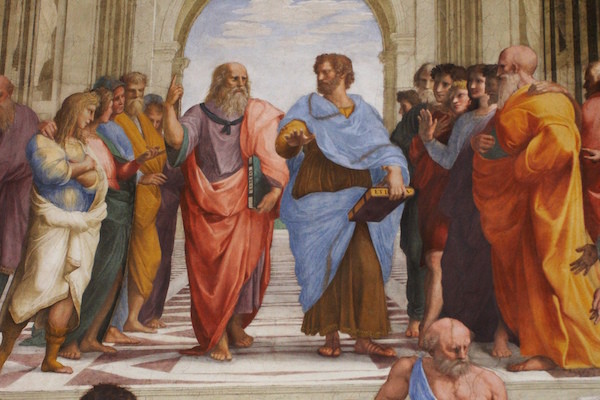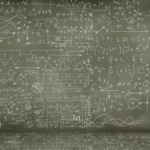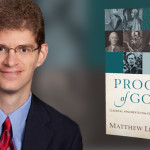Modern Atheism: Dragging Plato Along Aristotle’s Coattails
by Timothy Gordon
Filed under Atheism

In today's Catholic Church, Platonism and Aristotelianism are often considered equal. It is a dangerous error that hails all the way back to the first neo-Platonists in the third century. Simply put, the true description of reality, rightly recognized by the Catholic Church, is that account given by Aristotle (not Plato!) and confirmed by Thomas Aquinas.
But too many Catholics speak of Plato and Aristotle together, as if their metaphysics are identical. They are in fact nowhere near this. And when this error of conflation was combined with the the Enlightenment and the Reformation, the byproduct was a surge in atheism.
These two sixteenth century forces staged a joint revolt against the metaphysics of Aristotle. And the overly close association of Plato and Aristotle was and continues to be a major piece of the puzzle: in our day, Plato is either falsely held to be Aristotle’s equal, or even his philosophical better.
Even among Catholics, it hasn't been articulated commonly, plainly, or clearly enough: to abandon Aristotelian metaphysics and ethics is to veer toward atheism. Aristotelianism alone accounts for the close causal interaction of formal reality—"being qua being" or existence as it really is—and our day-to-day material lives. Platonism flatly rejects such an interaction.
Often, well-intentioned Catholic theologians have been all too ready to consider Plato a practical Aristotelian simply because St. Augustine was a sort of Platonist. (In fact, he was the precise sort—a neo-Platonist—who popularized the conflation. But more on that later.)
At present, suffice to affirm that Plato was not any sort of Aristotelian, proto- or otherwise, except in the very most mechanical sense: Plato first posited “form” and “matter,” and from there said perfectly opposite things (compared against Aristotle) about them. In fact, Plato divorced form from matter. The divorce of form and matter comprises the position of anti-realism to which the Modern world has predictably returned—following the anti-Aristotelian metaphysics of the two forces of Modernism, what I call “Prot-Enlight,” and also the philosophy of Immanuel Kant (the perfect vindication of both the Reformation and the Enlightenment).
And this is in turn due largely to the unhappy fact that neither ancient thinker, Plato nor Aristotle, has been studied with any consistent degree of seriousness, anytime following the Late Middle Ages.
Neo-Platonists and Straussians
As mentioned above, the first historical which equated Platonism with Aristotelianism were the neo-Platonists, who were the contemporaries (and in some cases, collaborators) of the Church Fathers, like Saint Augustine. Rather than emphasizing all of the plain errors in Plato's metaphysics, corrected by Aristotle, the neo-Platonists, especially those at Alexandria, highly exaggerated the few likenesses between Plato's and Aristotle's ontologies.
In other words, neo-Platonism generally regards Plato as an Aristotelian and vice versa. This falsity influenced many students in the early Roman empire, and continues to do so.
One factor that partly excuses neo-Platonism's false equivocation between Plato and Aristotle was the widespread disappearance and general unavailability of Aristotelian texts during this period (the third through the sixth century A.D.). The neo-Platonists wrongly but honestly assumed that Plato's student, Aristotle, had incorporated more of his teacher's system into his own metaphysics than he actually had. Where there existed a hole in Aristotelian scholarship, the neo-Platonists assumed (wrongly, most of the time) that Aristotle probably agreed with his teacher Plato.
And this is understandable enough.
But in today's academy, there is no longer any excuse for this equivocation. In any of today's colleges and universities willing to give Plato or Aristotle a read at all, which is far too few, the influence of cultish twentieth century thinker Leo Strauss prevails. What Strauss and the Straussians did to the philosophies of Plato and Aristotle was to re-bundle them, as neo-Platonism had, into a “package deal.” The Plato and Aristotle package.
And since none of the Straussians gave a sufficiently close or accurate read to either Plato or Aristotle, they tend(ed) to buy the neo-Platonist myth of the close lineage between the two metaphysics. (For whatever reason, Straussians studying the Medieval period in philosophy tend to focus on neo-Platonic-inclined Arab scholars like al-Farabi or Avicena instead of Aristotelian-leaning Averroes or Thomas Aquinas. And this tends to re-solidify the wrong impression inaugurated by the neo-Platonists.) The Straussians have not helped matters.
Prot-Enlight and Immanuel Kant
Naturally, it would require a much longer, drier article to enumerate fully all of the parties involved in the phenomenon of falsely aligning Plato and Aristotle—and what motivated each of these parties. Instead, what merits our attention is the Modern world, where the Reformation, the Enlightenment, and the philosophy of Immanuel Kant “undid” most of the corrections Aristotle made to Plato's thinking.
Long after the neo-Platonists, but long before the Straussians, two distinct sixteenth century groups wanted not necessarily to characterize Aristotle as a Platonist (or vice versa) but rather to kill Aristotelianism outright. In the main, Aristotelianism stands for reality’s incipient freedom and morality, its intelligibility, and its teleology. These three prongs not coincidentally characterize the Catholic view of reality. The Protestant reformers and the Enlightenment secularists wanted to depart from Aristotelianism for quite differing, even opposite, reasons.
But they shared at least one common goal: to unyoke the Modern world from the “thralldom” of Rome. Doing so involved the development of a Prot-Enlight ontology which viewed man’s nature as unfree (determinism), nature as unintelligible, and reality as purposeless (random or “non-teleological”). Perhaps a follow-up article, explaining how each they achieved this, and how a German philosopher would vindicate both 150 years later, is warranted.
That German philosopher, Immanuel Kant, vindicated both the Enlightenment and the Reformation by returning (in non-Platonic language) to Plato’s divorce of matter and form. In other words, what is knowable about this world constitutes practical knowledge, but is unimportant; what is knowable about reality constitutes pure knowledge, is important, but unknowable from this world. Such Kantianism falsely claimed to justify the overturn of Aristotle. Even into our age, this claim has fooled most of the world.
Jacques Maritain and the Way Forward
To date, the clearest and most definite argument put forth against the equation of Platonism with Aristotelianism was that of twentieth century Catholic philosopher Jacques Maritain. Maritain appraised Plato’s metaphysics as both vastly important for its undeniable contributions to the truth, and yet vastly wrong where it became too specific. (Plato was certainly the “big picture thinker” par excellence!) Such specific calculations about reality required Aristotle’s corrective hand, Maritain reasons.1
The only metaphysics sufficient to explain this intuitive truth of existence would have to be capable of positing a much closer causal connection between ideal reality—what Plato called the “really real”—and our material existence. Aristotle’s did this, and Thomas Aquinas’ perfected upon it by use of the concept of analogia.
The practical aspect of Maritain’s philosophy, aside from its bright distinction between Plato and Aristotle, was its popularity among non-philosopher Catholics. Readers of Maritain among the Catholic laity are able, en masse, to understand, from a truly Aristotelian perspective, just
how are we to explain the relationship between [material] things and their forms? Plato replied by calling them likenesses or participations of the forms. But these terms, which later will receive in Scholasticism a profound significance, are in Plato’s system nothing more than metaphors devoid of any strictly intelligible content…[which is] a pregnant conception which, in Aristotle’s hands, was to be purged of all internal contradiction, but which, as presented by Plato, seems self-contradictory…
By rightly pointing out the self-contradiction in Plato’s metaphysics of divorce—divorce between the world and meaning, between material objects and their forms, between reality and semblance—Maritain points us away from Kant, and back to the truth—that is, back to Aristotle and St. Thomas.
Conclusion
When the world embraces anti-realism, a divorce between form and matter, Aristotelian realism is abandoned and atheism naturally follows. The view of a rational, causal, meaningful universe requiring a God drops away…and you wind up with irrational, anti-philosophical worldviews, like the self-contradictory scientism of Laurence Krauss.
Now, this is truly a "strange notion," that the apparent winning philosophy has lost. In the hearts and minds of the West, the philosophia perennis has been passed over in favor of dozens of differing strains of Modernist alternatives over the last five centuries. In truth, only part of this blame can be attributed to the usual suspect one finds beneath popular falsities and behind the executioners of priests and philosophers: old-fashioned, prophet-slaying mobbishness.
In this particular case, the killers and deniers of the truth have been aided—and in that sense exculpated—by confused Modern philosophers themselves, who ought to know better, and who long ago popularized the supposed "closeness" of Plato and Aristotle.
Related Posts
Notes:
- For example, Plato could never solve the so-called “problem of the universals,” meaning that although he was certain the following could be done, he could never say quite how any substance could be predicated of more than one category at a time. How could a cow belong at the same time to the class “bovary” and to “four-legged animal,” for instance? Plato’s theory of the forms would not accommodate this most basic fact of reality, however intuitive. His metaphysics—aside from its correct positing of form and matter—was simply wrong. Aristotle’s wasn’t. ↩
Note: Our goal is to cultivate serious and respectful dialogue. While it's OK to disagree—even encouraged!—any snarky, offensive, or off-topic comments will be deleted. Before commenting please read the Commenting Rules and Tips. If you're having trouble commenting, read the Commenting Instructions.












